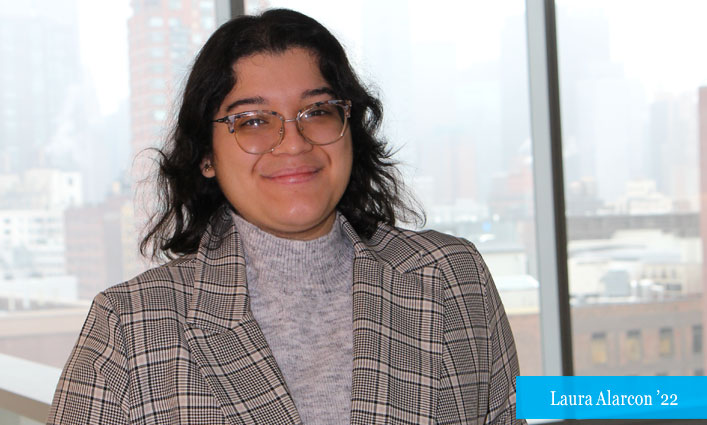
Research is an integral part of our mission and our annual Research and Creativity Expo underscores our dedication to student research. This year’s event (April 27-May 6) showcases research projects that our students have been working on with the guidance of their faculty mentors.
Laura Alarcon ’22, a Panamanian-American student from the Bronx, has experienced anxiety, which led her to conduct research on anxiety in the Latinx community. “My project looks at the effects of the Covid-19 pandemic on the mental health of Latinx and non-Hispanic white students at John Jay,” says Alarcon, a double major in English and forensic psychology. “I saw my own anxiety increase during the pandemic.”
“Our research showed that college students are under a significant amount of stress over a long period of time.” —Laura Alarcon ’22
Guided by Assistant Professor Rebecca Weiss, Ph.D., her faculty mentor, Alarcon used archival research, student surveys, and a database where the Perceived Stress Scale, or PSS-10—a questionnaire that measures how different situations affect stress in people ages 12 and above—could be applied to come up with a sample population for her project, a timeframe to focus on, and her hypothesis. “The data from fall 2019 was used as a pre-pandemic sample and spring 2020 became our pandemic sample,” she explains. “My hypothesis was that the stress levels would increase in the Latinx population. Unfortunately, the students in the fall 2019 and spring 2020 group were different, so we couldn’t compare how the same person was impacted by Covid-19 during the timeframe we selected.”
“Our research showed that college students are under a significant amount of stress over a long period of time,” says Alarcon, who begins a master’s degree in English Literary Studies at Queen’s University Belfast this fall. “If my study can show that college students in general need more support in dealing with stress, and leads to more access to resources so they can navigate their college experience better, it’s completely worth it.”
“So many people think they failed because their hypothesis wasn’t proven. That is not a failure. You’ve learned something new, which is exciting” —Laura Alarcon ’22
Laura’s Top Research Tips:
- Write in a compelling way. Write in a way that makes someone want to keep reading. Be clear, not stuffy or boring.
- Don’t stress about results. So many people think they failed because their hypothesis wasn’t proven. That is not a failure. You’ve learned something new, which is exciting.
- Get wide-ranging feedback. Let other people read your work. Give it to as many people as possible from different fields, ages, and levels of experience to make sure it’s clear and understandable for all.
- Understanding statistics is a process. I thought that everyone who conducts research had to have a very solid understanding of statistics research, but you don’t need to fully understand statistics. Surround yourself with people willing to train you and help you comprehend the stats.
- Keep tabs of your citations. Keep a running list of the articles you come across with citations in the relevant format. It will be a time-saver when you want to go back to that amazing piece of information later in the process.



